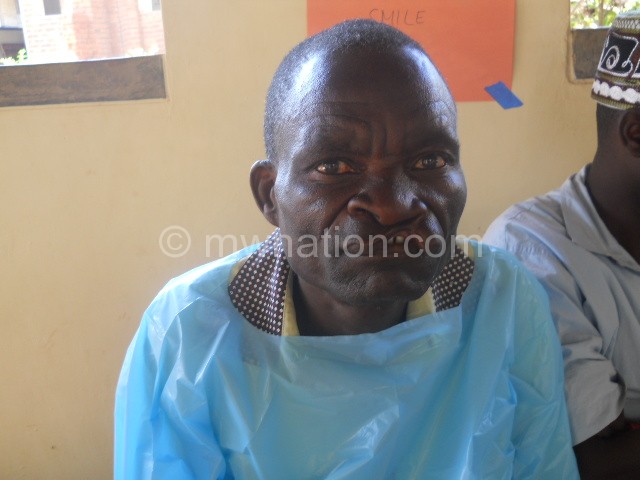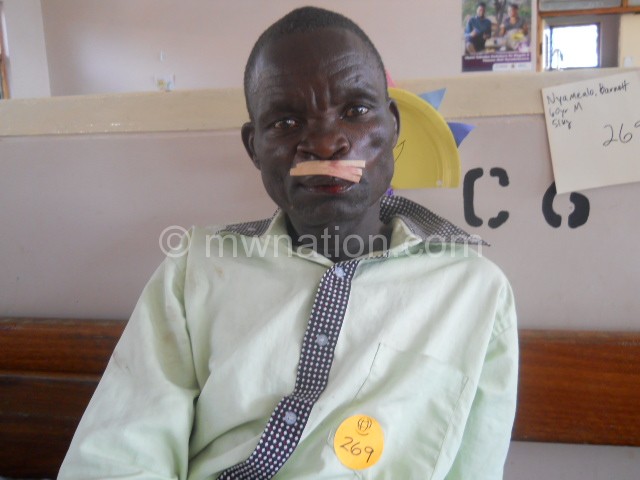Smiling back to normal
The country offers plenty of smiles and sights to entertain the curious tourist, but some of its citizens cannot afford a smile.
Obviously, this is not Denmark—which boasts being the World’s Happiest Nation having knocked down Switzerland into second place when the United Nations (UN) released the global index on March 20.

Neither is it in the league of war-torn Burundi, the unhappiest nation worldwide.
However, the likes of Bannet Nyambalo are living unhappily not because Malawi is short of things to smile about.
The man from T/A Mwambo in Zomba has been deprived of visible smiles for almost four decades as his lip disorder does not seem to count in the country.
Can you do without a smile? We asked him and his stammer told it all.
“Of course, yes,” he said, adding: “But a day looks like a year when you cannot afford one.”
For 46 years, he has been a cheerless stranger in his own world because his lips could not express his burning desire to smile at all things good for a yearning heart.
The man called himself an exile, saying: “I was an incomplete person living like an outcast.”
He was born with cleft lips, a split in the upper lip often associated with palates. Research shows the condition distorts facial expression, laughter and speech, exposing people to stigma and untold struggles when swallowing as some food exits through their noses.

Nyambalo’s parents may have neglected the deep slit on his upper lip out of ignorance, but he says: “It has ruined my life.”
The father-of-four, who endured ridicule and isolation, had to cover his mouth with his arm when talking.
“I was smiling in the heart,” he says. “I dropped out of school because my friends were scornful. I had very few friends because many villagers mocked me.”
This is history.
The lonely man, who feared to step out of his home, can emit a priceless smile like any other person in his community.
Two weeks ago, Nyambalo was among 155 Malawians who underwent life-changing surgery at Zomba Central Hospital (ZCH).
The group with lip defects thank Operation Smile Malawi, an international medical charity, for unleashing their smiles.
By providing free and safe surgery, Operation Smile is restoring the maligned population’s self-esteem and confidence in a world where smiles mean money for models and votes for politicians.
Previewing the World Happiness Report, Professor Jeffrey Sachs, the director of Earth Institute at the Columbia University, says: “Measuring self-reported happiness and achieving well-being should be every nation’s agenda as they begin to pursue Sustainable Development Goals [SDGs].”
‘Life begins at forty’ is an old saying, but Nyambalo said: “My life begins today.”
This represents a six-year lag.
And six is the age of a boy who was laying next to Nyambalo’s sickbed.
Happy mother Loveness Champion recounted the hardship of raising the child.
“When breast-feeding, milk was trickling to the ground since his mouth could not hold the nipples. So was porridge and liquid food,” said the woman who travelled from Thyolo.
The boy often shunned his peers at play for fear of demeaning slurs.
“I can’t wait to see his lips moving uniformly. His face looks handsome,” she hailed him with love, relief and contentment.
Operation Smile Malawi country manager Ibrahim Nthalika terms the 45-minute procedure “one of the simplest surgeries”.
But this is just about the duration Nyambalo was denied for almost five decades of ridicule since no public hospital offers the surgery all year round.
The service remains neglected and beyond reach for most Malawians, especially those who cannot afford to pay for the surgery at private hospitals.
Minister of Health Peter Kumpalume thinks newborns born in clinics have a higher chance of getting off to a smiling start in life.
“It is not good. We believe there are many people living with this correctable problem, but we can only address it if all mothers deliver at hospitals so that those with cleft lips and palates are recorded in our system. This will help us know that there is a need.”
He also decried lack of specialist doctors, saying government will do the needful to train more surgeons though it takes time to train one.
In Zomba, three local surgeons worked hand in hand with international volunteers to bring smiles to the needy.
According to Nthalika, only one local medic has volunteered since the operation started in 2012.
“The demand is high. Every camp registers over 200 clients,” he says.
The SDGs, which President Peter Mutharika and world leaders adopted last year, strive for a better health and life for all.
Sadly, Operation Smile reports one in every 10 children born with the reparable lip defects dies before the fifth birthday.
“We have operated on 731 people since 2012, but there is still more work to do,” says Nthalika.
He urges partners, including government, to continue supporting the free service to meet the unmet demand.




